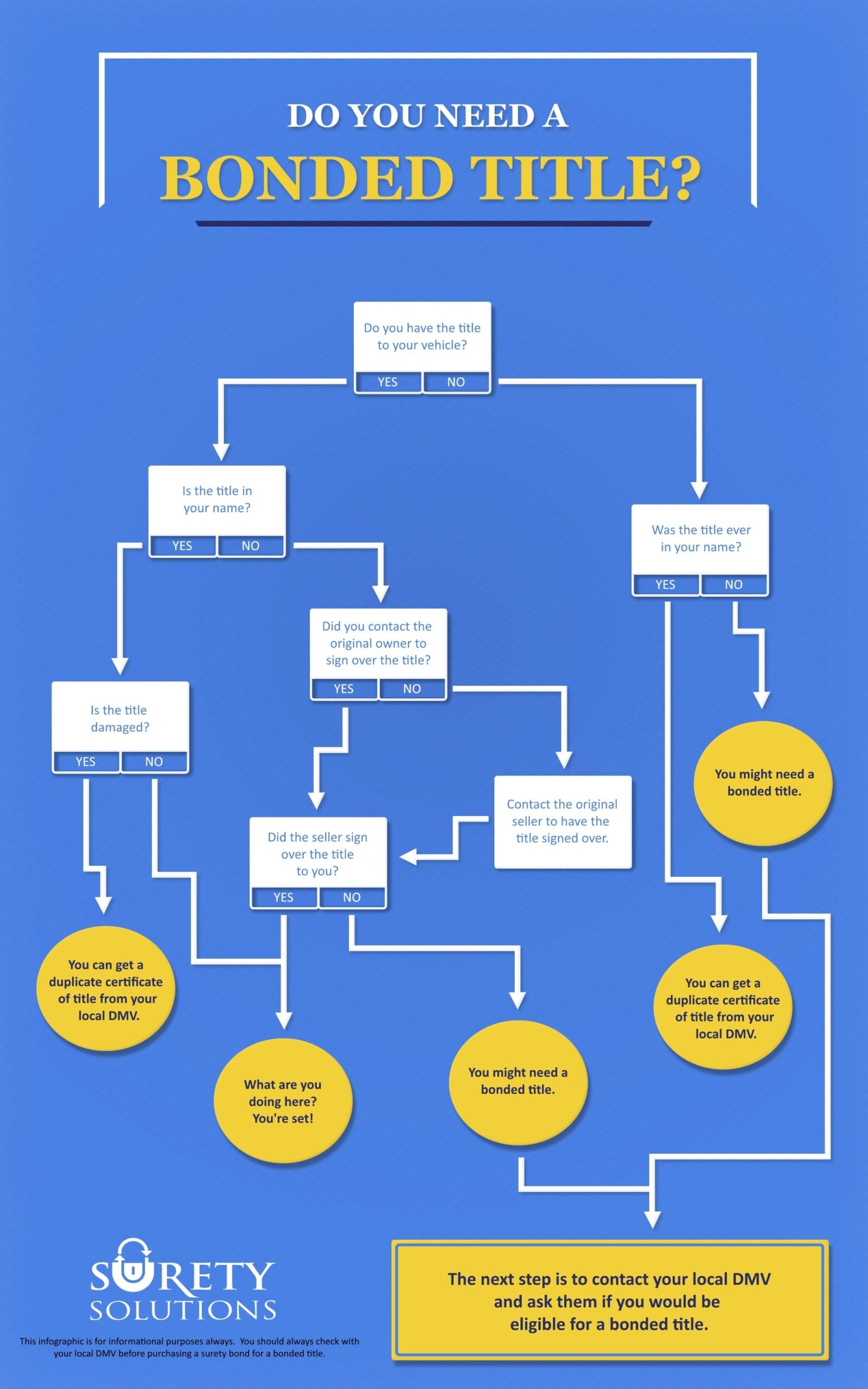
If you have a car in California, but no title, you might be wondering what you can do. You aren’t stuck yet. You might be able to get a California Bonded Title.
Short on time? Check out our Bonded Title FAQ page.
What is a California Bonded Title?
A California Bonded Title is a regular title that has a “bonded” brand on the title. Title brands are simply a way of permanently designating a title.
A “bonded” brand implies that there is a surety bond attached to the title.
Why You Need To Purchase a Surety Bond
The purpose of a California Lost Title surety bond is to protect any previous owners of the vehicle and the state of California.
You can learn more about how the surety bond works and what it means to be bonded at the end of the article.
When You Might Need a Bonded Title CA
- You bought/received a vehicle and didn’t receive a title
- You bought/received a vehicle and only received a bill of sale
- You bought/received a vehicle and received and improperly assigned title
- You bought/received a vehicle, received, and lost the title before transferring it into your name
You do not need a California Bonded Title if you had the title in your name at one point in time, but just lost the title. In this case, you are eligible to apply for a duplicate California Certificate of Title. The fee for a duplicate California Certificate Title is $19.
Not sure if you need a Bonded Title CA? Check out this awesome infographic.
How to get a California Bonded Title
Step #1: Check with local DMV to make sure you are eligible
Always check with your local DMV before starting the process. Some of the below steps might be different based on your situation.
While we list some common situations where you might be able to get a bonded title, we do not make the rules. Your local DMV is the only entity that can tell you if you are eligible for a bonded title.
Call them, explain your situation and why you do not have a title, and ask if you could get a bonded title.
If they say yes, move on to the next step.
Step #2: Complete paperwork – Application for Title or Registration
Have an authorized DMV employee or law enforcement office fill out a Verification of Vehicle form
Step #3: Complete a Statement of Facts form
The Statement of Facts form contains the following information:
- How, when, and from whom the vehicle was acquired
- What efforts were made to obtain original title, and why you could not obtain it
- The current value of the vehicle
Step #4: Fill out a Weight Certificate
You only need to fill out a Weight Certificate if your vehicle weighs less than 10,001 pounds when empty.
If your vehicle weighs 10,001 pounds or more, or is a trailer in the Permanent Trailer Identification (PTI) program, fill out the Declaration of Gross Vehicle Weight/Combined Gross Vehicle Weight Form certifying the estimated weight.
Step #5: Complete a Certificate of Non-Operation/Planned Non-Operation, if applicable
Step #6: Complete an odometer disclosure statement if you vehicle is less than 10 years old
Step #7: Determine the value of your vehicle and your bond amount
First, determine the value of your vehicle by using a price guide like Kelly Blue Book or NADA.
If you cannot find the value of your vehicle, contact your local DMV for how to get the value.
This value will also be your bond amount. For example, if your car is worth $2,000 then your bond amount will need to be $2,000.
Step #8: Purchase a California Lost Title Bond
Purchase a certificate of lost title bond from a company that issues surety bonds.
Make sure you apply for the correct bond amount that you determined in Step #7.
Your bond amount must be equal to the value of your vehicle. You do not need to pay the entire bond amount to get bonded.
The price you pay for your bond is normally around $100. It is a one-time payment.
Surety Solutions, A Gallagher Company does not issue Certificate of Lost Title Bonds
Before you purchase your title bond – learn important payment info
Once you purchase your surety bond, the surety bond company will mail it to you.
Step #9: Take paperwork to DMV
Take all your paperwork, plus your CA Lost Title Bond to your local DMV. If your paperwork is approved, you will be issued a CA Bonded Title. Your title will be marked “bonded”.
What It Means To Be Bonded
When you get a California Lost Title Bond, you are promising that you are the true owner of the vehicle. The surety bond is there to protect any previous owners of the vehicle and the California DMV.
If someone comes forward later on and says that they are the owner of the vehicle and that you should not have been granted a bonded title, they can make a claim on your bond.
If the claim is determined to be valid, you would be responsible for satisfying the claim. Usually, this would mean a financial compensation. The surety company would determine what is fair.
If you fail to satisfy the claim, the surety company would satisfy the claim for you. Then, they would come to you for reimbursement. Essentially, the bond holds you liable for your actions, no matter what.
Want more information about what happens if someone made a claim on your bond? Check out this resource.
Does my California Bonded Title Expire?
Yes, California Bonded Titles expire 3 years after they are issued. The “bonded” brand remains on the title during these 3 years.
There is nothing you need to do during this 3 year time period. You do not need to renew your California Lost Title Bond.
After the 3 year time period is up (as long as no one has made any claims against your title bond) the bond becomes null and void. You can go back to the DMV and apply for the “bonded” brand to be removed from the title.
If the DMV approves your request, you (or whoever owns the vehicle at the time) will be issued a clear certificate of title.
Related links:






